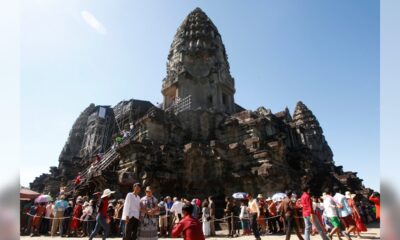Donald Trump attempted to “corrupt” the 2016 election when he directed his team to buy the silence of a porn actor who threatened to go public with claims of an extramarital affair, Manhattan prosecutors said during opening arguments in the first criminal trial against a former US president.
A lawyer for Trump, Todd Blanche, countered that his client was “cloaked in innocence” and had merely been trying to “protect his family, his reputation and his brand”. The 77-year-old former president was “not on the hook” for the way the payments were organised or recorded by his employees, with which he “had nothing to do”, Blanche added.
The competing narratives of the events that form the core of the “hush money” case against Trump came during the opening salvos of the first — and possibly only — criminal trial to proceed against the Republican nominee for president before November’s vote.
As Trump sat feet away at the defence table in a cold Manhattan courtroom on Monday morning, silently glowering, the seven men and five women on the jury heard assistant district attorney Matthew Colangelo outline a “catch and kill” scheme allegedly orchestrated by the former president and his inner circle to buy the silence of porn actor Stormy Daniels.
Daniels had threatened to go to the press with her story of how she had a tryst with the then-reality television star in 2006, Colangelo said, a revelation that would have been all the more damaging to Trump’s campaign following the furore over the publication of an Access Hollywood tape, in which he was heard to be bragging about grabbing women’s genitals.
Trump went on to disguise the transactions behind the $130,000 payment, Colangelo added, because he “wanted to conceal his and others’ criminal conduct”.
“This was a planned, co-ordinated, long-running conspiracy . . . to help Donald Trump get elected through illegal expenditures,” he said. “It was election fraud, pure and simple.”
Blanche said Trump was tackling a “sinister” attempt to embarrass him with false allegations, and had acted entirely lawfully in trying to suppress the story. “You will learn that companies do that all the time,” he told jurors, adding: “There is nothing wrong with trying to influence an election — it is called democracy.”
The start of the six-week trial comes just over a year after Manhattan district attorney Alvin Bragg brought the first criminal charges against a former US president, indicting Trump on 34 felony counts of falsifying business records.
Like any criminal defendant, Trump must be in attendance every day, a requirement that he has complained will limit his campaigning ahead of November’s election. The court will break on Wednesdays if the case is proceeding on schedule, Judge Juan Merchan said last week.
Trump railed against the court and prosecutors on social media and once again denounced the case as a witch hunt on his way into the courtroom on Monday morning. “This is done as election interference, everybody knows it,” the presumptive 2024 Republican nominee for the White House told reporters.
After opening arguments concluded, the court briefly heard from the prosecution’s first witness, former National Enquirer publisher David Pecker, who was allegedly involved in the “catch and kill” scheme by purchasing exclusive rights to anti-Trump stories — and then preventing them from being published.
Merchan adjourned early for the day due to the Passover Jewish holiday and to allow a juror to attend an emergency dental appointment.
Last week, 12 jurors and six alternates were chosen from a pool of almost 200 New Yorkers from the borough of Manhattan, who were carefully vetted to ensure they did not harbour insurmountable bias towards Trump. All said they could be impartial in deciding the facts of the case, although some expressed distaste for his policies and persona.
The former president still faces criminal charges in three different courts over his alleged attempts to thwart the peaceful transition of power after the 2020 election, and over his retention of classified documents at his Mar-a-Lago mansion in Florida. It is unclear when the other criminal cases will go to trial.
Trump also faces a number of civil proceedings, and is appealing against a nearly half-billion dollar civil fraud judgment awarded to the New York attorney-general earlier this year. A judge on Monday declined to heed a request by the attorney-general to invalidate the $175mn bond Trump had posted in that case, in a reprieve for the former president.
Another milestone in Trump’s legal travails will be reached later this week, when the US Supreme Court will hear arguments over whether he can claim presidential immunity for acts that he has been charged with that took place while he was in office. The outcome of that challenge has no bearing over the New York case, which has been brought under state rather than federal law.






























